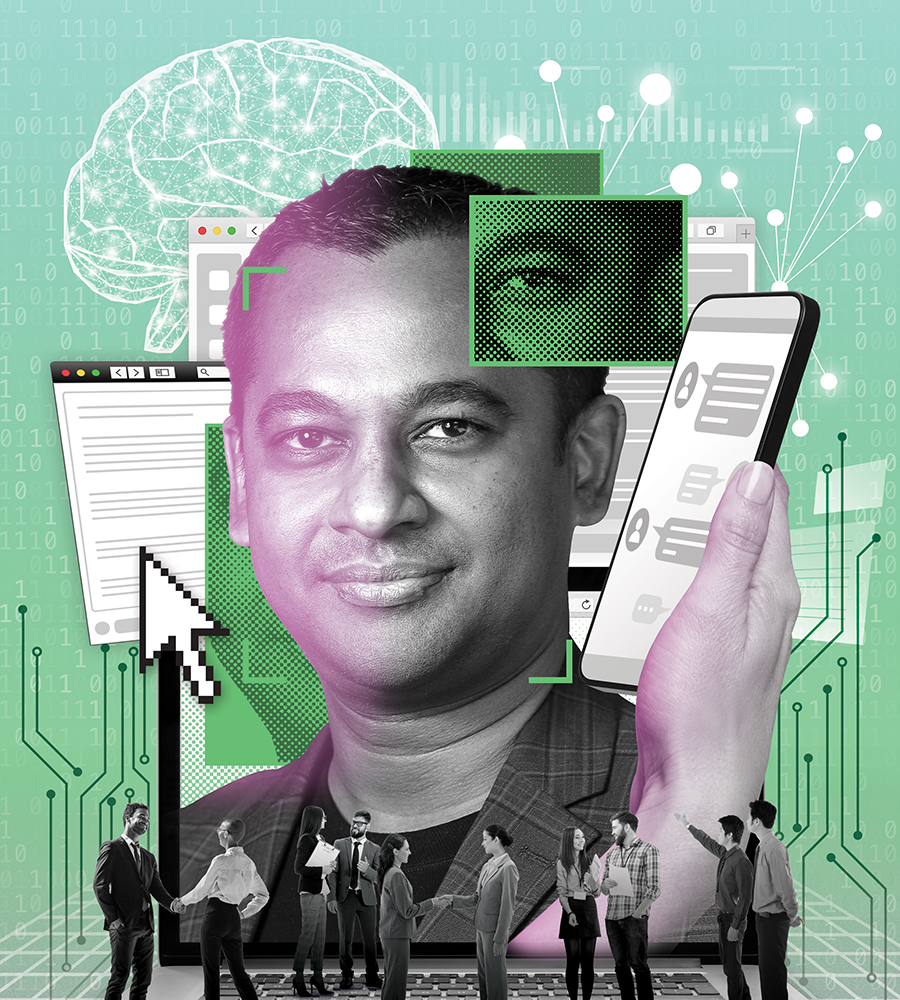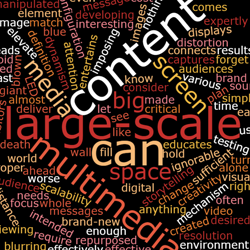|
insight
 IN THE AI OF
THE BEHOLDER
If you try to fight the future, the future always wins. When it
comes to face-to-face marketing, that's especially true of AI.
Here Veemal Gungadin, the CEO and founder of event-technology
company Gevme, shows how his company is using machine
intelligence to empower, not diminish, us. By Charles Pappas
VEEMAL GUNGADIN
Veemal Gungadin is the CEO and
founder of Singapore-based event
technology company Gevme. He is a
passionate tech entrepreneur with
deep expertise in the business-events
industry, who has built and scaled
Gevme into a holistic platform for
event professionals. Gungadin serves
on the board of directors and trustees
at Professional Convention Management
Association (PCMA), arguably the
world's largest network of business
events strategists. He also serves as
the honorary treasurer at the Singapore
Association of Convention and
Exhibition Organisers and Suppliers
(SACEOS), where he contributes to
the development and advancement of
business events in Singapore.
Veemal Gungadin can help answer that question. The head of Gevme, a Singapore-based event technology company, Gungadin is forging the way ahead with Spark, an AI-powered event tool that aims to transform the productivity and experience of event professionals. We caught up with him to see if he can tell us whether AI is the old hype or the new normal. EXHIBITOR Magazine: It seemed like Project Spark popped up out of nowhere. What's behind it? Veemal Gungadin: In the event industry's ever-evolving landscape, the COVID-19 pandemic brought about a wave of changes that forced professionals to innovate and adapt to meet the new demands and expectations of their clients and audiences. Some of these changes were temporary and reverted when the pandemic subsided, while others served as a catalyst for a significant transformation. While Gevme leads the development and optimization of the platform, the PCMA drives adoption of the technology through its network of business professionals and community events. One such momentous change was the availability of AI platforms the masses could use. At the time of this proliferation, the AI platforms available were still nascent in their development, showing promise but often falling short in reliability and precision. Their utility was primarily confined to broader tasks in content review and marketing — instances where meticulously crafted instructions were essential for effective use. At Gevme, we began to recognize the immense potential that this technology held for events. With PCMA fully onboard as a partner, the idea for Project Spark was conceived in early 2022. In simple terms, Project Spark is a generative AI platform built by event professionals for event professionals. We baked in decades of human experience in business events and a deep understanding of real-world requirements that is clearly reflected in the architecture of the product. While Gevme leads development and optimization of the Spark AI platform, PCMA drives the education and adoption of the technology through their network of business professionals as well as through community events. EM: Why do you think there's a need for a product like Project Spark? What can it do that others can't? VG: For a considerable period, the event industry has grappled with a talent shortage, a challenge that, again, was exacerbated by the pandemic. The event industry experienced the first closures and the last reopenings, highlighting its inherent volatility and worsening shortages in the workforce. Although we believe that this issue is temporary, the immediate solution is to optimize the current workforce, and that is where Project Spark becomes critical. Project Spark helps event teams boost their productivity and efficiency manifold. Event tasks that would have used up, say, three days' worth of a staff's bandwidth can be accomplished with Project Spark within hours. The founding team behind Spark brings decades of experience in business events, having orchestrated more than 5,000 events, so their understanding of real-world requirements is unmatched, and that is clearly reflected in the product. EM: Can you give me an example of something specific Project Spark can do and how it accomplishes more than what people could? VG: Project Spark really shines when it comes to making the most out of event content and digging deep into feedback. Take its “Repurpose” feature, for example. You feed it a session video, and it turns that into a whole range of stuff like blog posts, social media updates, e-books, and even full-blown courses. This isn't just a huge time-saver, it's a gamechanger for keeping your content fresh and engaging across different platforms, which is challenging and time-consuming to do by hand. Then there's the “analysis” part of Spark. Loads of feedback from your event is a goldmine of insights, but sorting through it all is overwhelming. Spark takes all that data, sifts through it, and hands you a report that's not just packed with insights, but also easy to understand.  roject Spark helps event teams boost their productivity and efficiency
manifold. Event tasks that
would've used three days' worth of
a staff's bandwidth can be accomplished
with Project Spark within hours.
VG: Gartner recently published an article about the hype cycle of emerging technologies and placed generative AI squarely in the segment pertaining to the peak of inflated expectations. We do see that playing out in the events industry in some ways. On one end of the spectrum is a set of people that believes AI will replace jobs, whereas on the other end there is lack of confidence in AI's utility. Having said that, every time Gevme or PCMA has conducted a workshop or delivered a session about AI or Project Spark, the response has been resounding. Event professionals have been very open to exploring it and working it into their daily routine. Project Spark was built with the aim of augmenting the capabilities of an event professional, thereby increasing their productivity. AI will not replace humans, but humans with AI will replace humans without AI. With our latest releases, we are testing the boundaries of AI in events. Imagine “SmartBots” that can train themselves using your live event feed and then act as a real-time info desk for people with questions. EM: Where do you see AI having the greatest effect in the short run in the events world? VG: We see AI increasing workforce productivity by augmenting human capabilities. Starting with content generation activities, such as writing emails, generating event agendas, writing speaker bios, or even crafting press releases, Project Spark can greatly reduce workload on event marketers. Even if we look beyond Project Spark, we see AI greatly impacting attendee engagement in business events. Chatbots powered by AI can provide the most real-time information to attendee queries. AI-powered recommendation engines, like the one native to Gevme, can help ensure a fulfilling networking lobby for attendees, sponsors, and exhibitors alike. The most exciting part of all this is that all of these applications of AI in the events industry are already in practice and are slated to become a norm very soon. EM: That last statement fascinates me. How would you be able to judge if the recommendations for a “fulfilling networking lobby” were better from AI rather than from humans? Do you have a test case you could compare to events that don't use AI? VG: To get the measure of AI's edge in creating a top-notch networking lobby, we'd dive into the data and look at the numbers that show deeper engagement, more connections made, maybe even happier feedback from attendees. You'd compare these figures with events that didn't use AI. EM: In the long run, where do you see AI having the greatest impact in the events world? VG: It's exciting to see the event industry not only beginning to accept AI but also pinning some very high expectations on its applications. While this is common for a technology in the second stage of its hype cycle, where initial proof-of-concept stories and media interest spark a surge in industry attention and investment, we believe these expectations will compel the players to push boundaries and drive innovations. For example, sustainable events have been a key part of our mission statement for a while, and we have been continuously working toward developing solutions to tackle some common sustainability challenges at events. AI can play a monumental role in promoting sustainability at events. AI can analyze real-time data to automatically adjust energy use in event venues, minimizing waste and reducing carbon emissions. In waste management, AI can predict patterns and optimize recycling processes. Moreover, AI can enhance sustainable procurement by assessing suppliers' sustainability credentials and aid in smart resource management, ensuring efficient use of resources, such as food and beverage. EM: In terms of events, what are you most hopeful/curious about when it comes to AI? VG: We believe AI can have a positive impact on networking and engagement. Use AI to facilitate meaningful connections among relevant event stakeholders to help them achieve their objectives. Harness AI's real-time sentiment-analysis capabilities to recommend attendee engagement strategies that ensure attendees leave with the most beneficial experience. This will create a vibrant event ecosystem, where all involved parties are enthusiastic and eagerly anticipating the next event. E
ANYTHING CHATGPT CAN DO, THESE CAN DO BETTER (USUALLY)
According to MIT Sloan Management, 90 percent of organizations believe they'll get a competitive edge from AI, so more than eight out of 10 companies say AI is a priority in their business plans. ChatGPT is the often the default companies use, but its drawbacks — its tendency to “hallucinate” (make stuff up) and drift (decline in quality in some areas when it improves in others) — don't always make it an effective tool. Here are three alternatives that will give your AI effort a little more byte. ➊ Chatsonic Integrated with Google Knowledge Graph, Chatsonic can provide relevant and trending information and allow you to create accurate content on any given topic. Chatsonic can also create images using AI art-generation models such as Stable diffusion and DALL-E. ➋ Jasper Working mostly with text-based content Like ChatGPT, Jasper can assist you in running integrated marketing campaigns, optimizing content for SEO, writing blogs, and planning for social media campaigns. ➌ Perplexity Funded in part by Amazon's Jeff Bezos, Perplexity differentiates itself from Google by not displaying a cascade of links while answering questions, instead synthesizing answers from information gathered and offering citations to back the facts up — making it a reliable tool for business research. Like ChatGPT, it can write copy for social media and blogs, and it also keeps a “library” of your past questions and answers. The pro version permits unlimited queries and allows you to upload documents, images, and more for it to learn from.
|
|
|
||||||||||||||||||||||||||||
|
|
||||||||||||||||||||||||||||
|
TOPICS Measurement & Budgeting Planning & Execution Marketing & Promotion Events & Venues Personal & Career Exhibits & Experiences International Exhibiting Resources for Rookies Research & Resources |
MAGAZINE Subscribe Today! Renew Subscription Update Address Digital Downloads Newsletters Advertise |
FIND IT Exhibit & Display Producers Products & Services All Companies Get Listed |
EXHIBITORLIVE Sessions Certification Exhibit Hall Exhibit at the Show Registration |
ETRAK Sessions Certification F.A.Q. Registration |
EDUCATION WEEK Overview Sessions Hotel Registration |
CERTIFICATION The Program Steps to Certification Faculty and Staff Enroll in CTSM Submit Quiz Answers My CTSM |
AWARDS Sizzle Awards Exhibit Design Awards Portable/Modular Awards Corporate Event Awards Centers of Excellence |
NEWS Associations/Press Awards Company News International New Products People Shows & Events Venues & Destinations EXHIBITOR News |
||||||||||||||||||||
|
||||||||||||||||||||||||||||






